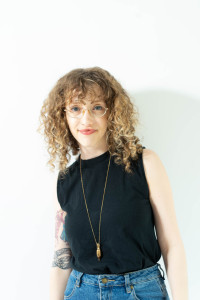 “Community is such an important part of being a writer!” says author and editor Lilly Dancyger in her FPP Interview and I couldn’t agree more. Read her thoughts on women’s anger, her upcoming memoir Negative Space, and her advice for emerging writers, then hear her read live with Sam Perkins, Pitchaya Sudbanthad, Sarah Van Arsdale, and Mimi Wong this Sunday at Silvana from 6-8pm. Silvana is located at 300 W. 116th St near Frederick Douglass Blvd. Books sold by Word Up! Books. Admission is free. Please RSVP via Eventbrite here. – SPL
“Community is such an important part of being a writer!” says author and editor Lilly Dancyger in her FPP Interview and I couldn’t agree more. Read her thoughts on women’s anger, her upcoming memoir Negative Space, and her advice for emerging writers, then hear her read live with Sam Perkins, Pitchaya Sudbanthad, Sarah Van Arsdale, and Mimi Wong this Sunday at Silvana from 6-8pm. Silvana is located at 300 W. 116th St near Frederick Douglass Blvd. Books sold by Word Up! Books. Admission is free. Please RSVP via Eventbrite here. – SPL
Sophia Shalmiyev calls Burn It Down: Women Writing About Anger “a potent literary offering…glorious, punk as hell, and utterly necessary.” As editor, you wrote that despite soliciting work on women’s anger, you sometimes had to prod writers to allow that anger come across unrestrained on the page. What did you learn about women’s anger and its expressions while editing this book?
I think the most important thing I learned—which I guess I always knew, but editing this anthology really drove it home for me—is that there really is no way to get rid of anger by denying it, or shoving it down. In so many of the essays in Burn It Down, the writers talked about what happened when they tried to deny their anger—and it always found another way to come out. It came out as sadness, or illness, or guilt, but it always came out. The only real way to stop anger from having power over us is to acknowledge it, accept it, and learn to harness it.
You’re the founder and host of Memoir Monday. You’ve served or continue to serve as a contributing editor, writing instructor, columnist, and assistant books editor. You’ve proven yourself to be a devoted and significant literary arts community builder. What has this work taught you over the years? How has it informed your own writing?
Community is such an important part of being a writer! There are definitely times when it feels cliquey, or tiring, and it can sometimes be hard to balance the extrovert work of going out to events and connecting with other writers with the quieter work of actually writing… but I think it’s such a misconception that writers are solitary creatures. Sure, sometimes you have to lock yourself in your apartment for a week and wear dirty pajamas and tune out everything other than the draft you’re writing, but talking to other writers, reading other work, seeing what’s out there and the conversations people are having—that’s how you grow!
Finding community has made my work so much better because it’s made me aware of the conversations that my work fits into. Paying attention to what else is out there has helped me see what’s possible for my own work—what groundwork has been laid for me, and what I can add. It’s essential, truly.
Carmen Maria Machado selected your memoir Negative Space as a Sante Fe Writers Project winner, to be published in 2021. Tell us about this book and what the process has been like for you to-date.
Negative Space is a braided hybrid memoir—it’s the story of my father’s life, art, heroin addiction, and death; and it’s the story of the decade that I spent uncovering his story by interviewing people who knew him, reading his notebooks and letters, and engaging with the imagery of his work. It’s been a long, long process—I started writing this book when I was still in undergrad, it was rejected more than 50 times over 5 different rounds of submissions to agents and small presses. I cancelled a book deal and fired an agent along the way. And then I did one last major overhaul revision and I told my husband, “I think this is it. If it doesn’t land somewhere this time, I’m gonna have to put it in a drawer and move on.” And so of course that was when Carmen selected it! I am so grateful to her, and to the whole SFWP team who have been absolutely incredible so far. I am a small press evangelist—and not just because I’m also a small press editor! I really do love the flexibility and the dedicated attention you get with a small press.
What advice would you give emerging writers today?
Get on Twitter. Don’t get sucked into the political nightmare side of it, but use it to find writers who are coming up through the muck with you—and writers who are where you hope to be. Go to readings, introduce yourself to people in the audience and to the readers. Tell writers whose work you admire that it resonated with you. Read contemporary writers! The classics are great but your work is not going to be in direct conversation with the classics—get to know your peers. Identify a few publications, editors, and reading series that feel like really good fits for the work you want to do, and then get to know them. Read your goal publications, attend your goal readings series. Just get yourself out there into the thick of it.
